Associate degree verification is a critical component of employment background checks that confirms a candidate's educational credentials from community colleges and two-year institutions. As employment fraud continues to rise in 2025, with studies showing that approximately 30-40% of resumes contain some form of educational misrepresentation, employers must implement thorough verification processes to ensure candidate qualifications are legitimate and meet position requirements.
Key Takeaways
- Associate degree verification confirms the authenticity of two-year college credentials through direct contact with issuing institutions or authorized clearinghouses like the National Student Clearinghouse.
- Community college background checks typically take 2-5 business days to complete, though timelines vary based on institution responsiveness and record-keeping systems.
- Employers must obtain written consent from candidates before conducting educational background checks to comply with Fair Credit Reporting Act (FCRA) regulations.
- Online degree verification services provide faster results than traditional methods, with some platforms offering same-day confirmation for participating institutions.
- Transcript verification provides more detailed information than basic degree confirmation, including courses taken, grades earned, and graduation dates.
- Community colleges maintain student records for varying periods, typically 5-10 years for active records and permanently for degree conferral information.
- International community college credentials require additional verification steps, often involving credential evaluation services to assess U.S. equivalency.
Why Associate Degree Verification Matters for Employers
The prevalence of credential fraud has made associate degree verification an essential risk management practice for organizations of all sizes. Recent data from background screening industry reports indicates that educational verification uncovers discrepancies in 25-35% of checks performed. These misrepresentations range from incorrect graduation dates to completely fabricated degrees. Such fraud can expose employers to significant liabilities, including negligent hiring claims, workplace safety issues, and reputational damage if unqualified employees fail to perform critical job functions.
Community college credentials are particularly vulnerable to falsification because of the decentralized nature of the U.S. community college system. Over 1,000 institutions operate independently across the country. Unlike four-year universities that often have more robust verification systems and greater name recognition, community colleges may have limited online verification portals or outdated record-keeping processes. This fragmentation makes fraudulent claims harder to detect through casual research.
Beyond fraud prevention, thorough associate degree verification supports workforce quality and regulatory compliance initiatives. Many positions require specific associate-level credentials as minimum qualifications:
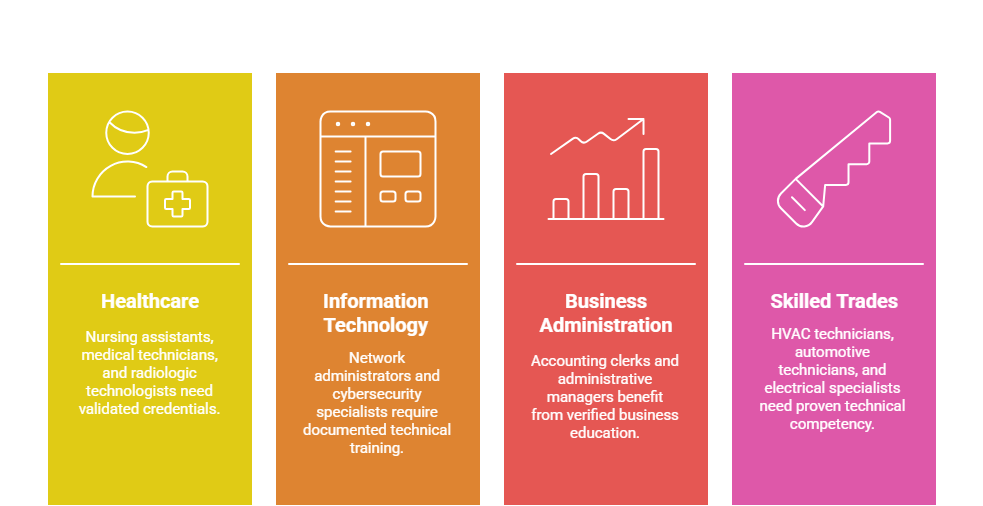
- Healthcare roles: Nursing assistants, medical technicians, and radiologic technologists need validated credentials
- Information technology: Network administrators and cybersecurity specialists require documented technical training
- Business administration: Accounting clerks and administrative managers benefit from verified business education
- Skilled trades: HVAC technicians, automotive technicians, and electrical specialists need proven technical competency
For organizations in regulated industries, proper credential verification also demonstrates due diligence to auditors, accreditation bodies, and licensing authorities. These stakeholders expect documented proof of employee qualifications.
Understanding the Community College Background Check Process

Community college background checks differ from traditional four-year university verifications in several important ways that affect timing, methodology, and cost. The verification process involves contacting the educational institution directly or through authorized intermediaries to confirm details provided by the candidate. Standard verification requests confirm the candidate's enrollment dates, program of study, degree type conferred, and graduation date. Employers can request additional information such as GPA, honors received, or specific coursework completion depending on job requirements.
Most community colleges designate specific departments to handle verification requests, typically the Registrar's Office or Office of Academic Records. These departments follow strict protocols governed by the Family Educational Rights and Privacy Act (FERPA). FERPA protects student education records from unauthorized disclosure and requires institutions to verify the identity and authorization of parties requesting information.
The verification landscape has evolved significantly with the advent of digital record-keeping and third-party clearinghouses. The National Student Clearinghouse serves as the primary centralized database for degree and enrollment verification in the United States. It maintains records for over 3,600 participating institutions including the majority of community colleges. This system dramatically reduces verification turnaround times and costs compared to traditional methods.
Required Documentation and Candidate Consent
Employers must secure explicit written authorization before initiating any associate degree verification as part of a background check under FCRA requirements. This authorization should be provided on a standalone document separate from the employment application. It must clearly explain the nature and scope of the background check being conducted.
The candidate must provide several key pieces of information to facilitate accurate verification:
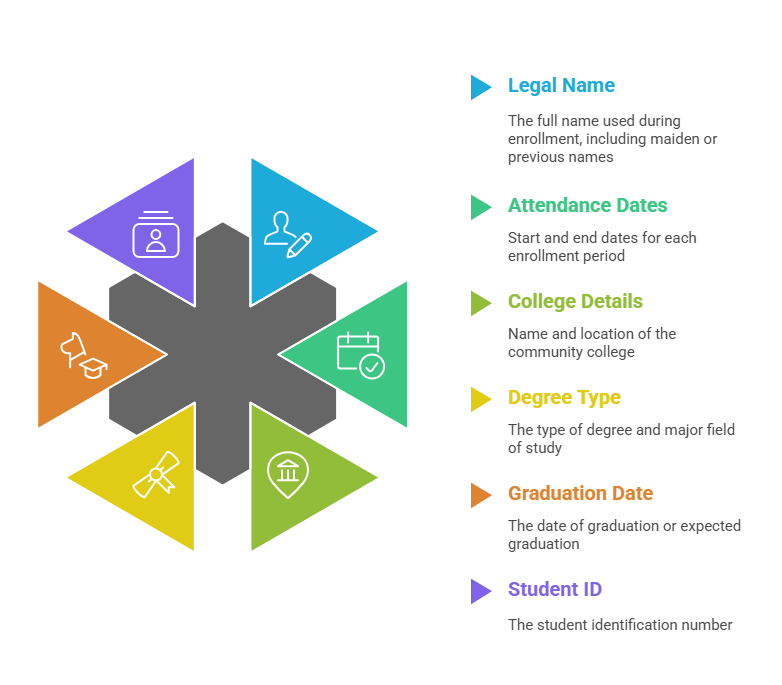
- Full legal name used at the time of enrollment (including maiden names or previous names)
- Complete dates of attendance with start and end dates for each enrollment period
- Name and location of the community college with campus designation if multiple locations exist
- Degree type and major field of study or program concentration
- Graduation date or expected graduation date for recently completed programs
- Student identification number if available (optional but helpful)
Proper documentation protects both employers and candidates by establishing clear authorization trails and ensuring verification accuracy. When candidates provide incomplete or inaccurate information, verification delays commonly occur.
Direct Institutional Verification Methods
Direct verification through community colleges remains a viable option, particularly for institutions not participating in clearinghouse networks. It's also useful when employers need detailed transcript information beyond basic degree confirmation. Most community colleges offer multiple verification channels including online request portals, email submissions, fax requests, or traditional mail correspondence.
| Verification Channel | Processing Time | Best Use Case |
| Online Portals | 1-3 business days | Fast turnaround, participating institutions |
| Email/Fax | 3-7 business days | Mid-range urgency, direct contact needed |
| Traditional Mail | 7-14 business days | Non-urgent requests, formal documentation |
Cost structures for direct verification vary significantly across institutions. Some community colleges offer free basic verification services as a courtesy to graduates and prospective employers. Others charge fees ranging from $5 to $25 per verification request.
Third-Party Verification Services and Clearinghouses
Third-party background screening companies and verification services offer streamlined processes that consolidate multiple verification types into single-platform solutions. These services maintain relationships with educational institutions, clearinghouses, and credential databases. This network enables faster verification turnaround times compared to employers conducting verifications independently.
The National Student Clearinghouse represents the most comprehensive third-party verification resource, serving as the trusted agent for participating institutions. Employers can access verification services through the DegreeVerify® platform. This platform provides instant degree and enrollment confirmation for a majority of U.S. colleges and universities including most community colleges. Per-verification costs through the clearinghouse typically range from $15 to $25 depending on search parameters and result delivery methods.
Professional screening services also provide value-added capabilities:
- Verification result interpretation: Expert analysis of complex verification outcomes
- Discrepancy resolution support: Assistance navigating inconsistencies in candidate information
- Adverse action compliance: Guidance through FCRA-required procedures
- Consolidated reporting: Integration with other background check components
These additional services prove particularly valuable for smaller organizations without dedicated human resources staff or those lacking expertise in background screening regulations.
What Information Can Be Verified
Associate degree verification scope varies based on verification method, institutional policies, and the level of detail requested by the employer. Standard verification confirms basic educational credentials. Enhanced verification may include comprehensive academic performance data depending on candidate authorization and employer requirements.
Basic degree verification confirms the core facts of a candidate's educational claims:
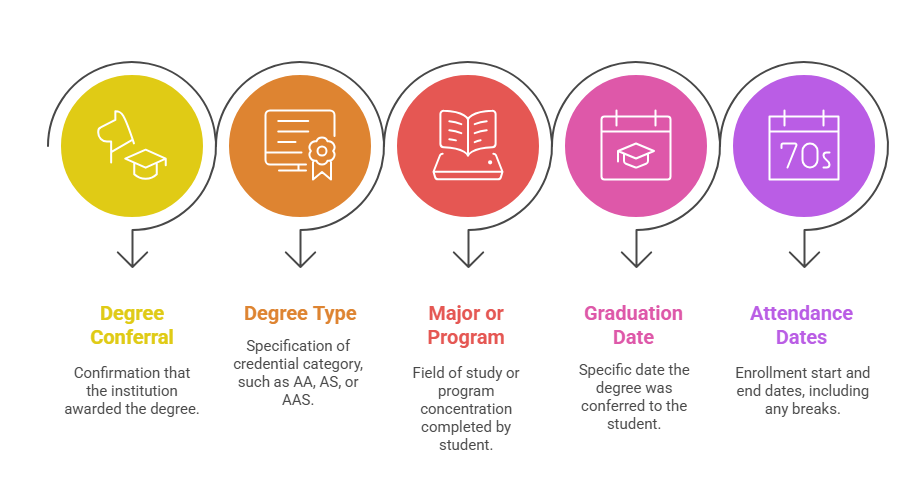
- Degree Conferral: Confirmation that the institution awarded the associate degree to the candidate
- Degree Type: Specification of credential category (AA, AS, AAS, or specialized associate-level credentials)
- Major or Program: Field of study or program concentration completed
- Graduation Date: Specific date the degree was conferred (typically month and year)
- Attendance Dates: Enrollment start and end dates, including breaks in enrollment
Enhanced verification extends beyond basic confirmation to include academic performance metrics and detailed educational history. These additional data points require explicit candidate consent and may incur higher verification costs or longer processing times. Grade point average (GPA) represents the most commonly requested enhanced data point, particularly for entry-level positions where recent graduates have limited professional experience.
Enrollment Verification vs. Degree Verification
Distinguishing between enrollment verification and degree verification proves critical for accurate candidate assessment. These represent fundamentally different educational outcomes. Enrollment verification confirms that a candidate attended a community college during specific time periods. However, it makes no representation about credential completion or academic achievement.
| Verification Type | What It Confirms | Best For |
| Enrollment Verification | Attendance during specific periods | Positions accepting "some college" or credit hour requirements |
| Degree Verification | Credential conferral and completion | Positions requiring associate degree as minimum qualification |
| Transcript Verification | Complete academic record with courses and grades | Technical roles needing specific coursework validation |
Degree verification specifically confirms credential conferral, providing assurance that the candidate successfully completed all program requirements. This distinction becomes particularly important when evaluating candidates who may have attended multiple institutions, transferred credits, or stopped enrollment before completing degree requirements.
Transcript Verification and Academic Records
Full transcript verification provides the most comprehensive view of a candidate's community college education. It includes complete course histories, grades earned, credits attempted and completed, and academic honors or disciplinary actions. Official transcripts also show cumulative GPA calculations. These documents serve as the authoritative academic record maintained by the institution.
Obtaining official transcripts requires more extensive candidate cooperation and typically involves higher costs and longer processing times. Candidates must formally request transcript release directly from their community colleges. They authorize the institution to send sealed official transcripts either to the employer directly or to a background screening intermediary. Most community colleges charge transcript fees ranging from $5 to $15 per copy.
Transcript analysis requires careful evaluation to extract job-relevant insights while avoiding potentially discriminatory practices. Employers should establish clear, documented criteria for evaluating transcripts that directly relate to position requirements. Examples include minimum grades in specific courses, completion of particular course sequences, or overall GPA thresholds that indicate academic preparation for role demands.
Legal Compliance and Regulatory Requirements
Associate degree verification falls under multiple regulatory frameworks that govern employment screening practices, candidate privacy rights, and fair hiring procedures. The Fair Credit Reporting Act (FCRA) is primary among these regulations. It classifies educational background checks as consumer reports when conducted by third-party screening companies. This classification triggers specific disclosure, authorization, and adverse action requirements.
FCRA compliance begins with proper disclosure and authorization procedures before initiating any verification. Employers must provide candidates with a clear, standalone disclosure document. This document explains that a background check will be conducted, separate from employment applications or other hiring paperwork. After receiving this disclosure, candidates must provide written authorization specifically permitting the background check.
When verification results reveal discrepancies or information that could negatively impact hiring decisions, employers must follow FCRA adverse action procedures:
- Pre-adverse action notice: Provide candidate with copy of background check report and FCRA rights summary
- Reasonable waiting period: Allow 5-7 business days for candidate to review and dispute inaccuracies
- Final adverse action notice: Issue formal notice if proceeding with negative employment decision
- Documentation retention: Maintain all records according to FCRA requirements
Failure to properly execute adverse action procedures exposes employers to significant legal liability, including statutory damages, actual damages for employment losses, and attorney's fees.
FERPA Considerations for Educational Record Access
The Family Educational Rights and Privacy Act establishes strict controls over educational record disclosure by institutions receiving federal funding. This encompasses virtually all community colleges in the United States. FERPA protects student education records from unauthorized disclosure. It requires institutions to obtain student consent before releasing records to third parties with limited exceptions.
Community colleges typically manage FERPA compliance through standardized verification request forms that document candidate authorization and employer identity. These forms require specific information that demonstrates legitimate educational interest and proper authorization chain. Required elements include candidate signature with date, specific records being requested, and designated recipients authorized to receive the information.
Understanding FERPA's directory information provisions helps employers recognize what limited information institutions may disclose without specific consent:
- Student name
- Attendance dates
- Degrees and awards received
- Most recent previous educational institution attended
However, institutions must provide students with opportunities to restrict even directory information disclosure, and many students exercise these rights.
State-Specific Verification Regulations
Beyond federal requirements, numerous states have enacted laws governing employment background checks that affect associate degree verification practices. These state laws may impose stricter standards than federal requirements. Limitations can include restrictions on how far back verification can extend, limits on considering certain educational information in hiring decisions, or enhanced candidate rights regarding record accuracy disputes.
Several states have implemented "ban the box" laws that restrict when and how employers can inquire about criminal history. Some states extend similar concepts to educational requirements. California, New York, Massachusetts, and other states have particularly robust employment screening regulations that include specific provisions affecting educational verification. Employers operating in multiple states must ensure compliance with the most stringent applicable regulations.
Common Verification Challenges and Solutions
Associate degree verification encounters numerous practical obstacles that can delay hiring processes, create candidate friction, or produce inconclusive results requiring additional investigation. Understanding common challenges and implementing proactive solutions helps employers maintain efficient verification workflows while ensuring thorough credential confirmation.
Name matching issues represent the single most common verification challenge. They occur when candidates use different names on employment applications than the names under which they enrolled at community colleges. Women who married and changed surnames after graduation frequently encounter this issue. These discrepancies don't indicate fraudulent intent but create verification barriers.
Institutional changes including college mergers, name changes, or closures significantly complicate verification efforts. The community college landscape has undergone substantial consolidation in recent years. When candidates list colleges that no longer exist under previous names, verification requires identifying successor institutions that maintain historical records.
Handling Verification Discrepancies
When verification results don't match candidate-provided information, employers must carefully evaluate the nature and significance of discrepancies before making employment decisions. Minor inconsistencies such as slightly different graduation dates generally don't indicate fraudulent intent. Significant discrepancies require more serious scrutiny.
Best practices for discrepancy resolution include:
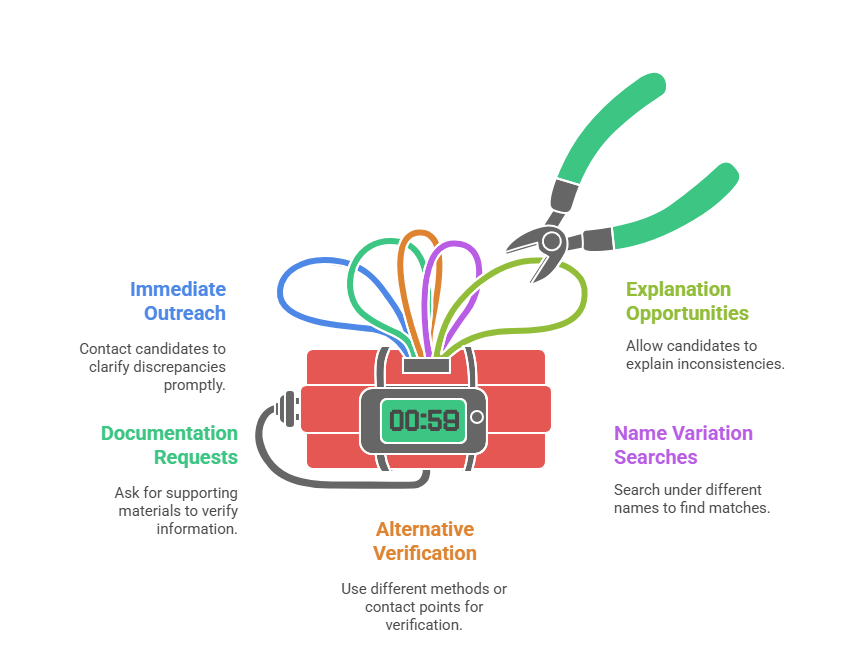
- Immediate candidate outreach: Contact candidates as soon as discrepancies appear to request clarification
- Documentation requests: Ask for supporting materials such as diplomas or unofficial transcripts
- Alternative verification attempts: Try different methods or additional institution contact points
- Name variation searches: Search under maiden names or previous legal names
- Reasonable explanation opportunities: Allow candidates to explain circumstances that might account for inconsistencies
Throughout discrepancy investigation, employers must maintain objective, consistent evaluation standards applied uniformly across all candidates. Subjective judgments about discrepancy severity create discrimination risks and potential EEOC claims.
Verifying Credentials from Closed Institutions
Community college closures, while relatively uncommon, create significant verification challenges when they occur. When institutions close, their student records transfer to designated custodians. These custodians are typically state education departments, regional accrediting agencies, or successor institutions that assume responsibility for historical record maintenance.
State higher education agencies maintain directories of closed institutions and record custodians. These agencies serve as the first resource when attempting to verify credentials from defunct colleges. They can direct verification requests to appropriate record holders and often provide guidance on required documentation and processing timelines. However, archived record access typically takes longer than active institution verification.
| Record Custodian Type | Typical Response Time | Access Process |
| State Education Departments | 2-4 weeks | Formal written request with candidate authorization |
| Regional Accrediting Bodies | 3-5 weeks | Contact accreditor for record location guidance |
| Successor Institutions | 1-3 weeks | Standard verification procedures with historical records note |
For employers encountering closed institution verification needs, alternative documentation may provide faster resolution than pursuing archived records. Candidates often possess personal copies of diplomas, unofficial transcripts, or other documentation that can corroborate claimed credentials.
International Community College Credential Evaluation
Candidates with associate degrees or equivalent credentials from international institutions require specialized verification approaches. These approaches account for different educational systems, documentation standards, and credential evaluation needs. Community college equivalents exist in many countries under various names—including further education colleges in the UK, CEGEP institutions in Quebec, and junior colleges in numerous countries.
Several organizations provide international credential evaluation services accredited by the National Association of Credential Evaluation Services (NACES) or the Association of International Credential Evaluators (AICE). These evaluators review foreign transcripts, diplomas, and institutional documentation. They determine U.S. educational equivalency, producing detailed reports that explain the foreign credential's comparable U.S. degree level. Evaluation costs typically range from $100 to $300 depending on detail level and turnaround time.
Best Practices for Employers and HR Professionals
Implementing effective associate degree verification programs requires systematic approaches that balance thoroughness with efficiency while maintaining regulatory compliance. Organizations should develop documented verification policies that establish clear standards for when verification is required, what information will be confirmed, and procedures for handling verification outcomes.
Verification timing significantly impacts both hiring efficiency and candidate experience. Initiating verification after preliminary screenings but before final offers allows adequate completion time. Most organizations optimize timing by conducting checks on final candidates after interviews but before formal offers.
Establishing relationships with frequently verified institutions streamlines recurring verification needs. For employers who regularly hire from specific community colleges, direct contacts with registrar offices can expedite verification processes.
Developing a Verification Policy Framework
Comprehensive verification policies should address several key components:
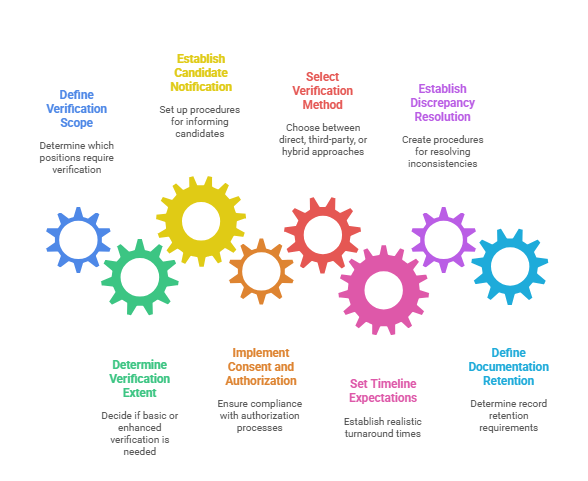
- Verification scope definition: Which positions require verification based on job-related credential requirements
- Verification extent: Whether basic degree confirmation suffices or enhanced verification is needed
- Candidate notification procedures: When and how candidates will be informed about verification requirements
- Consent and authorization processes: Required authorization forms and FCRA compliance procedures
- Verification method selection: Whether to conduct direct verification, use third-party services, or employ hybrid approaches
- Timeline expectations: Realistic turnaround time expectations accounting for typical processing periods
- Discrepancy resolution protocols: Procedures for investigating and resolving verification inconsistencies
- Documentation retention: Record retention requirements for verification results
Policy development should involve legal counsel review to ensure compliance with applicable regulations. Policies should undergo periodic review and updates as regulations evolve.
Balancing Speed and Accuracy in Verification
The tension between hiring speed and verification thoroughness challenges many organizations in competitive talent markets. Delayed decisions risk losing candidates, while inadequate verification creates significant risks including negligent hiring liability.
Optimal verification programs find balance through risk-based approaches. For roles where associate degrees represent preferred qualifications, expedited clearinghouse verification may provide sufficient assurance. Positions where degrees are required or where unqualified employees could cause harm justify thorough verification. Technology solutions increasingly enable faster verification without sacrificing accuracy through automated platforms, real-time status updates, and integrated documentation trails.
Cost Considerations and Budget Planning
Associate degree verification costs vary significantly based on verification methods, service providers, and volumes. Organizations must budget appropriately while optimizing cost-effectiveness through strategic service selection.
Direct institutional verification typically represents the lowest-cost option. However, administrative time required to manage verification requests often exceeds nominal clearinghouse fees.
| Service Type | Typical Cost | Processing Time | Best For |
| Basic Clearinghouse Verification | $15-$25 | Instant-24 hours | High-volume verification of standard degrees |
| Enhanced Clearinghouse Verification | $25-$35 | 24-48 hours | Detailed verification including enrollment history |
| Full-Service Background Screening | $35-$50 | 2-5 business days | Comprehensive checks with multiple verification types |
| Official Transcript Request | $10-$30 | 3-10 business days | Positions requiring detailed academic records |
Volume pricing arrangements provide cost savings for organizations conducting frequent verifications.
Calculating Total Cost of Verification Programs
Complete verification program costs extend beyond per-verification fees. Staff time represents a significant cost element including HR personnel hours for verification management and discrepancy investigation.
Technology costs include applicant tracking system integrations and background screening platform subscriptions. While requiring upfront costs, these investments typically generate positive returns through efficiency improvements.
Organizations should budget for exceptional scenarios including international credential evaluation ($100-$300), closed institution searches ($50-$150), and expedited processing ($25-$75 additional). Maintaining contingency budgets prevents verification delays when unusual circumstances arise.
ROI of Thorough Verification Programs
Investment in comprehensive verification programs generates returns that often substantially exceed costs. Primary ROI derives from avoiding negligent hiring costs including recruiting and training replacements when fraud is discovered. A single prevented bad hire typically generates savings of 1.5-2x the annual salary.
Quality improvement through verification maintains workforce competency standards, supporting productivity and regulatory compliance. For healthcare organizations and professional services firms, verification programs generate ROI through maintained licensure and avoided sanctions. Enhanced legal compliance reduces risks of EEOC claims, FCRA violations, and negligent hiring liability.
Conclusion
Associate degree verification stands as an essential component of thorough employment screening that protects organizations from credential fraud. It ensures workforce quality and regulatory compliance. As educational credential misrepresentation continues affecting hiring outcomes, employers must implement systematic verification processes that leverage appropriate technology solutions. By understanding verification methods, common challenges, and best practices outlined in this guide, HR professionals and hiring managers can develop effective verification programs tailored to their organizational requirements and risk profiles.
Frequently Asked Questions
How long does associate degree verification typically take?
Associate degree verification timelines vary by method. National Student Clearinghouse searches provide instant to 24-hour results for participating institutions. Direct institutional verification takes 2-5 business days on average, while full-service background screening with educational verification completes within 3-5 business days. Verification delays occur when institutions are unresponsive, during peak academic periods, or when verification requests contain incomplete or inaccurate candidate information requiring follow-up clarification.
Can employers verify associate degrees without candidate permission?
No, employers must obtain written authorization from candidates before conducting educational background checks under FCRA requirements. Community colleges are restricted by FERPA from releasing student education records without proper consent. Verification attempts without authorization will be refused by institutions. Employers who conduct unauthorized verification face potential legal liability under both FCRA and state privacy laws.
What should employers do if verification reveals a fake degree?
When verification uncovers fabricated credentials, employers should document findings thoroughly and follow FCRA adverse action procedures if the verification was conducted as a consumer report. They should provide candidates with opportunities to address discrepancies before final decisions. If the position requires the claimed credential, employers should rescind conditional offers or terminate employment and review their verification processes to identify any gaps.
Do all community colleges participate in the National Student Clearinghouse?
No, while the majority of U.S. community colleges participate in the National Student Clearinghouse, some institutions remain outside the network and require direct verification contact. Employers should have fallback procedures for verifying credentials from non-participating institutions through direct registrar contact. The Clearinghouse website maintains a participating institution directory that employers can reference when planning verification approaches.
How far back can employers verify associate degrees?
There are no legal time limitations on how far back employers can verify educational credentials. Community colleges maintain permanent records of degree conferral even if they limit retention periods for detailed academic records like transcripts. Most verification requests focus on credentials earned within the past 10-15 years, though older degrees can typically still be confirmed through appropriate research.
What's the difference between verifying an associate degree and verifying a certificate?
Associate degrees represent two-year undergraduate credentials requiring approximately 60 credit hours and general education coursework. Certificates typically indicate shorter program completion (often 15-40 credit hours) focused on specific skill development without broad general education requirements. Verification processes are similar, but certificate verification may be more challenging because some community colleges don't report certificate completions to clearinghouse systems as consistently as they report degree conferrals.
Can employers verify associate degrees from online community colleges?
Yes, online community colleges can be verified through the same methods as traditional campus-based institutions. Many online community colleges participate in the National Student Clearinghouse network, and those that don't can be verified through direct registrar contact. Employers should distinguish between legitimate regionally-accredited online community college programs and diploma mill operations using resources like the U.S. Department of Education's database of accredited institutions.
What information do I need to provide for associate degree verification?
Candidates should provide their full legal name as it appears on college records (including any name changes since graduation), exact attendance dates with start and end terms, and name and location of the community college with campus specification if applicable. They should also include associate degree type (AA, AS, AAS, etc.) and major field of study, graduation date, and any student identification numbers if available. Providing accurate, complete information prevents verification delays and ensures successful credential confirmation.
How much does associate degree verification cost employers?
Verification costs range from free (for some direct institutional verifications) to $15-$25 for National Student Clearinghouse searches, $25-$50 for full-service background screening that includes educational verification, and $10-$30 for official transcript requests. Organizations conducting high verification volumes can negotiate discounted rates with screening services. Total program costs should include both per-verification fees and administrative overhead for managing verification processes.
What happens if a community college has closed and verification isn't possible?
When community colleges close, their student records transfer to designated custodians such as state education agencies, regional accrediting bodies, or successor institutions. Verification requires contacting these record custodians, which employers can identify through state higher education department directories. If official records were lost or destroyed—a rare occurrence—employers must decide whether alternative documentation such as candidate-provided diplomas provides sufficient credential confirmation or whether the position's requirements demand official verification.
Additional Resources
- National Student Clearinghouse: DegreeVerify® - Official Educational Verification Service
https://www.studentclearinghouse.org/colleges/degreeverify/ - Federal Trade Commission: Using Consumer Reports for Employment Decisions - FCRA Guidance
https://www.ftc.gov/business-guidance/resources/using-consumer-reports-what-employers-need-know - U.S. Department of Education: Database of Accredited Postsecondary Institutions and Programs
https://ope.ed.gov/dapip/ - Professional Background Screening Association: Best Practices for Employment Screening
https://www.pbsa.org/ - National Association of Credential Evaluation Services: Find a Credential Evaluation Service
https://www.naces.org/members - Society for Human Resource Management: Background Checks and Reference Checks Resource Center
https://www.shrm.org/topics-tools/tools/toolkits/background-reference-checks - U.S. Department of Education: Family Educational Rights and Privacy Act (FERPA) Guidance
https://www2.ed.gov/policy/gen/guid/fpco/ferpa/index.html
Still have questions?
Get in touch with our team today for a personalized demo and discover how our tailored volume pricing and packages can drive results for your business!
How useful was this page?*
Note: your comments are anonymous. We use them to improve the website. Do not include any personal details.
Visit our FCRA Compliance Tool or leave a message here if you need a response.
From the blog Explore the GCheck Content Hub

Building a Strategic Screening Framework for International Hires in 2026
14 Jan, 2026 • 15 min read
Drug Testing Policies for Remote Employees: A 2026 Compliance and Strategy Guide
13 Jan, 2026 • 21 min read
Best Background Checks for Temporary Workers: A Strategic Framework for 2026
13 Jan, 2026 • 15 min readThe information provided in this article is for general informational and educational purposes only and should not be construed as legal advice or a substitute for consultation with qualified legal counsel. While we strive to ensure accuracy, employment screening laws and regulations—including but not limited to the Fair Credit Reporting Act (FCRA), Equal Employment Opportunity Commission (EEOC) guidelines, state and local ban-the-box laws, industry-specific requirements, and other applicable federal, state, and local statutes—are subject to frequent changes, varying interpretations, and jurisdiction-specific applications that may affect their implementation in your organization. Employers and screening decision-makers are solely responsible for ensuring their background check policies, procedures, and practices comply with all applicable laws and regulations relevant to their specific industry, location, and circumstances. We strongly recommend consulting with qualified employment law attorneys and compliance professionals before making hiring, tenant screening, or other decisions based on background check information.

